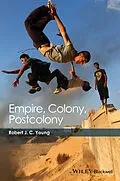Empire, Colony, Postcolony provides a clear exposition of the historical, political and ideological dimensions of colonialism, imperialism, and postcolonialism, with clear explanations of these categories, which relate their histories to contemporary political issues. The book analyzes major concepts and explains the meaning of key terms.
* The first book to introduce the main historical and cultural parameters of the different categories of empire, colony, postcolony, nation, and globalization and the ways in which they are analyzed today
* Explains in clear and accessible language the historical and theoretical origins of postcolonial theory as well as providing a postcolonial perspective on the formations of the contemporary world
* Written by an acknowledged expert on postcolonialism
Autorentext
Robert J.C. Young, FBA, is Julius Silver Professor of English and Comparative Literature at New York University. His writing ranges across the fields of cultural and political history, literature, philosophy, photography, psychoanalysis and translation studies, with a particular focus on colonial history and postcolonial theory. His publications include White Mythologies: Writing History and the West (1990), Colonial Desire: Hybridity in Culture, Theory and Race (1995), Postcolonialism: An Historical Introduction (Wiley, 2001), Postcolonialism: A Very Short Introduction (2003), and The Idea of English Ethnicity (Wiley, 2008). He is the editor of Interventions: International Journal of Postcolonial Studies.
Klappentext
This key introduction to the field explains in clear and accessible language the historical and theoretical origins of the political formations of empire, colony, postcolony, nation and globalization. Providing a clear and effective historical narrative for students, the text leads readers through the experience of colonization, and in particular, of being colonized. At the same time, Young provides a lucid exposition of the historical, political and ideological dimensions of the related concepts of colonialism, imperialism, nationalism and postcolonialism, with in-depth explanations of these categories which relate them to historical issues such as slavery as well as to contemporary political issues such as globalization, migration and events in the Middle East. The development and scope of the field of postcolonial studies is vast; this invaluable and unique text distills the subject to the central arguments, ideas and lines of historical development, allowing students access to the most important historical contexts and to a social-political contextualization of postcolonial studies and the world in which we live today.
Zusammenfassung
Empire, Colony, Postcolony provides a clear exposition of the historical, political and ideological dimensions of colonialism, imperialism, and postcolonialism, with clear explanations of these categories, which relate their histories to contemporary political issues. The book analyzes major concepts and explains the meaning of key terms.
- The first book to introduce the main historical and cultural parameters of the different categories of empire, colony, postcolony, nation, and globalization and the ways in which they are analyzed today
- Explains in clear and accessible language the historical and theoretical origins of postcolonial theory as well as providing a postcolonial perspective on the formations of the contemporary world
- Written by an acknowledged expert on postcolonialism
Inhalt
Acknowledgments viii
1 Introduction 1
2 Empire 7
3 Colony 27
4 Slavery and Race 42
5 Colonialism and Imperialism 52
6 Nation 66
7 Nationalism 77
8 Anticolonialism 85
9 Decolonization 103
10 Neo?]colonialism, Globalization, Planetarity 117
11 Postcolony 135
12 Postcolonialism 149
References 178
Name Index 191
Subject Index 195
